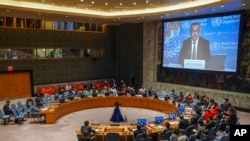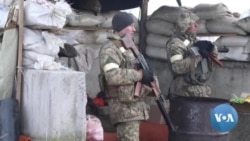The head of the World Health Organization said Thursday that "the lifesaving medicine" needed in Ukraine is peace.
"Prolonged conflict is in nobody's interests and will only prolong the suffering of the most vulnerable," WHO Director-General Tedros Adhanom Ghebreyesus told an emergency U.N. Security Council session on the deteriorating humanitarian situation in Ukraine, which has been under Russian airstrikes and shelling for the past three weeks.
Tedros reported that WHO has verified 43 attacks on health care facilities, which have killed a dozen people and injured 34 others.
Attacks on hospitals can rise to the level of war crimes.
Tedros said WHO is working with Ukraine's Ministry of Health and has so far sent about 100 metric tons of medical supplies to the country.
"We have now established supply lines from our warehouse in Lviv to many cities of Ukraine, but challenges with access remain," Tedros said. Lviv is in western Ukraine, which has remained relatively safe.
He said WHO has critical supplies ready to enter difficult areas on joint U.N. convoys but has so far not been able to get them in.
Besieged cities
"Today, for example, the U.N. convoy to Sumy that included a WHO truck carrying critical medical supplies was unable to enter," he said. Sumy, near the Russian border in the northeast, has come under heavy bombardment, making it difficult and dangerous for civilians to evacuate safely.
"Loads ready for Mariupol remain in staging areas and cannot proceed," Tedros said of the besieged southern city. "Access to these and other areas is now critical."
U.N. political chief Rosemary DiCarlo said hundreds of residential buildings, as well as schools and hospitals, have been destroyed or damaged in three weeks of conflict.
Since Russia began its invasion on February 24, the U.N. has verified the killing of 726 civilians, including 52 children. More than 1,000 other civilians have been injured. The U.N. says the true numbers are likely much higher.
"It is the responsibility of all sides to fully abide by their obligations to protect the lives of all civilians everywhere," DiCarlo said.
She expressed particular concern for residents trapped in Mariupol, where a maternity hospital was bombed on March 9 and a theater, where hundreds of people were sheltering, was hit on Wednesday. The city has been cut off from food, water, electricity and medical care, and bodies lie in the streets uncollected.
"The devastation in Mariupol and Kharkiv raises grave fears about the fate of millions of residents in Kyiv and other cities facing intensifying attacks," DiCarlo said.
The U.N. refugee agency, UNHCR, says the conflict has sent more than 3.1 million people fleeing to neighboring European countries and has displaced 2 million more inside Ukraine.
Impact beyond Ukraine
"Russia will be held accountable for its atrocities," U.S. Ambassador Linda Thomas-Greenfield said. "There is only one way to end this madness. President (Vladimir) Putin: Stop the killings. Withdraw your forces. Leave Ukraine once and for all."
Several council members echoed her outrage with Moscow's war and the suffering it has caused.
"The main news is that Ukraine is holding on, that Ukraine is resisting and Ukraine is winning and Russia is deep in the mud: on the ground, morally, legally and internationally," Albania's ambassador, Ferit Hoxha, said.
There were also concerns about the broader humanitarian implications of the conflict.
Russia and Ukraine account for nearly one-third of the world's wheat, and almost 50 nations are dependent on both countries for over 30% of their wheat import needs. War could disrupt food supplies to many countries already grappling with food insecurity.
"I find it a damning indictment that this council has to plead with the Russian Federation not to deprive civilian populations of food and water, not to deny them the basic infrastructure they need for daily existence, for survival," Ireland's envoy, Geraldine Byrne Nason, said.
China, which has not criticized Russia for its invasion, called for maximum restraint and the protection of civilians.
"The international community shares the common wish for a cease-fire at an early date to alleviate the situation on the ground and prevent civilian casualties," Ambassador Zhang Jun said. "This is also the expectation of China."
He said Beijing, which is not usually among the big international aid donors, has sent humanitarian supplies to Ukraine through its Red Cross Society, including milk powder and blankets for children.
Several council members also mentioned Wednesday's decision by the International Court of Justice, which ruled Russia must "immediately suspend its military operations" in Ukraine. The decision is legally binding, but Russia is unlikely to comply with it.
Russia doubles down
For its part, Russia's ambassador repeated the narrative of being the victim of a Western disinformation campaign about the offensive, saying it is "reaching new heights."
"We note with regret that Ukraine has always [been] a pawn in the geopolitical struggle against Russia and remains such a pawn still," Vassily Nebenzia told the council. "Western politicians could not care less about the suffering of the people in Donbas."
Donbas is the region in eastern Ukraine that comprises Luhansk and Donetsk, the two breakaway republics that President Putin recognized as independent days before he ordered the invasion of Ukraine.
On the humanitarian situation, Nebenzia said he was calling off his delegation's planned vote Friday morning on a draft resolution. It was drawn up to counter a text from Western council members deploring the humanitarian consequences of Russia's invasion and seeking a cease-fire for humanitarian access.
Moscow was certain to be isolated again in the council if it brought its doomed resolution to a vote. Council members repeatedly noted Thursday that Russia putting forward such a draft was cynical and hypocritical, and that if Moscow really wanted to solve the humanitarian crisis in Ukraine, it could start by ending its war.
"But we are not withdrawing the draft resolution," Nebenzia insisted. "Instead, tomorrow morning we will ask for an emergency meeting to discuss again the issue of U.S. bio-laboratories in Ukraine, using the new documents we obtained in the course of the special military operation."
Last Friday, the Russians called for a meeting on the same subject. Nebenzia spoke for nearly 20 minutes, alleging without evidence that Ukraine, funded by the U.S. military, was developing biological weapons in at least 30 laboratories across the country.
United Nations High Representative for Disarmament Affairs Izumi Nakamitsu told council members that the U.N. "is not aware of any biological weapons programs."
The United States and Ukraine have both dismissed Moscow's accusations.
U.S. officials have expressed concerns that Moscow is making such accusations because it may be laying the groundwork for a false flag operation in Ukraine involving biological or chemical weapons.






